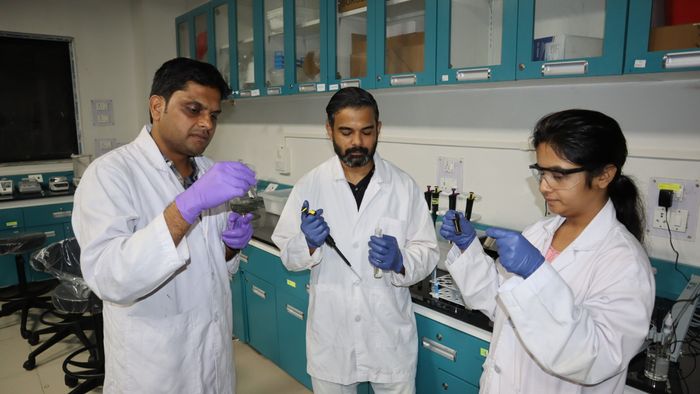IIT Guwahati researchers makes path-breaking discoveries regarding use of modified graphene oxide
Researchers at the Indian Institute of Technology Guwahati (IITG) led by Dr. Rajiv K. Kar have made important discoveries regarding the use of modified graphene oxide for biomedical applications.

- Nov 07, 2023,
- Updated Nov 07, 2023, 4:10 PM IST
Researchers at the Indian Institute of Technology Guwahati (IITG) led by Dr Rajiv K. Kar, Assistant Professor, Jyoti and Bhupat Mehta School of Health Sciences and Technology, IIT Guwahati, have made important discoveries regarding the use of modified graphene oxide for biomedical applications.
The team has also developed cost-effective experiments for modifying graphene oxide that can be used by other academic institutions to train personnel needed for cutting-edge projects in semiconductors, nanoelectronics, healthcare, and quantum technologies supported by the Indian Government.
Graphene, a Nobel Prize-winning material, is exceptionally strong and possesses outstanding electrical and thermal conductivity. Its oxidised form, called Graphene Oxide (GO), offers a large surface area and low cytotoxicity, making it suitable for medical applications. GO can be further engineered through defects, doping, and functional modifications, which enhance its optical and electrical properties for improved biomedical sensing applications.
Also Read: Why Are Some IIT Alumni Choosing to Embrace ISKCON
Researchers at Jyoti and Bhupat Mehta School of Health Sciences and Technology at IIT Guwahati are focusing on a specific functional modification of graphene involving the attachment of an amino acid, Cysteine or simple amine group, attachment over graphene.
Speaking on the functionalized Graphene oxide, Dr Rajiv Kar, Assistant Professor, Jyoti and Bhupat Mehta School of Health Sciences and Technology, IIT Guwahati, said,” We studied how amino acid modified Graphene Oxide behaves in liquid. We found that a particular bond in Cys-GO sheets enhances their stability, reducing random movements. This research has the potential to aid in the development of biomarkers for disease detection.”
The team's extensive knowledge of Graphene-based materials has led to the development of innovative laboratory experiments designed to provide students with hands-on skills and inspire them to explore the possibilities of advanced materials. These experiments are integrated into a Biomedical Science and Engineering (BMSE) course at IIT Guwahati’s Jyoti and Bhupat Mehta School of Health Sciences and Technology.
Speaking about the innovative course for biomedical education, Dr Rajiv K Kar said, ”These low-cost laboratory experiments are applicable also to chemical, material science, nanotechnology, and interdisciplinary courses. We believe these techniques will help in developing hands-on skills and inspire budding researchers and future scientists to find innovative solutions in the field of Biomedical Science and Engineering,"
The research findings have been published in The Journal of Physical Chemistry C and Journal of Chemical Education in a paper authored by Dr Rajiv K. Kar along with his research scholars, Rajan Singh, Shweta Tiwari, and Jyotirekha Jena.
The research has been supported by the Indian Council of Medical Research and the Indian Nanoelectronics Users Program, funded by the Ministry of Electronics and Information Technology (MeitY).